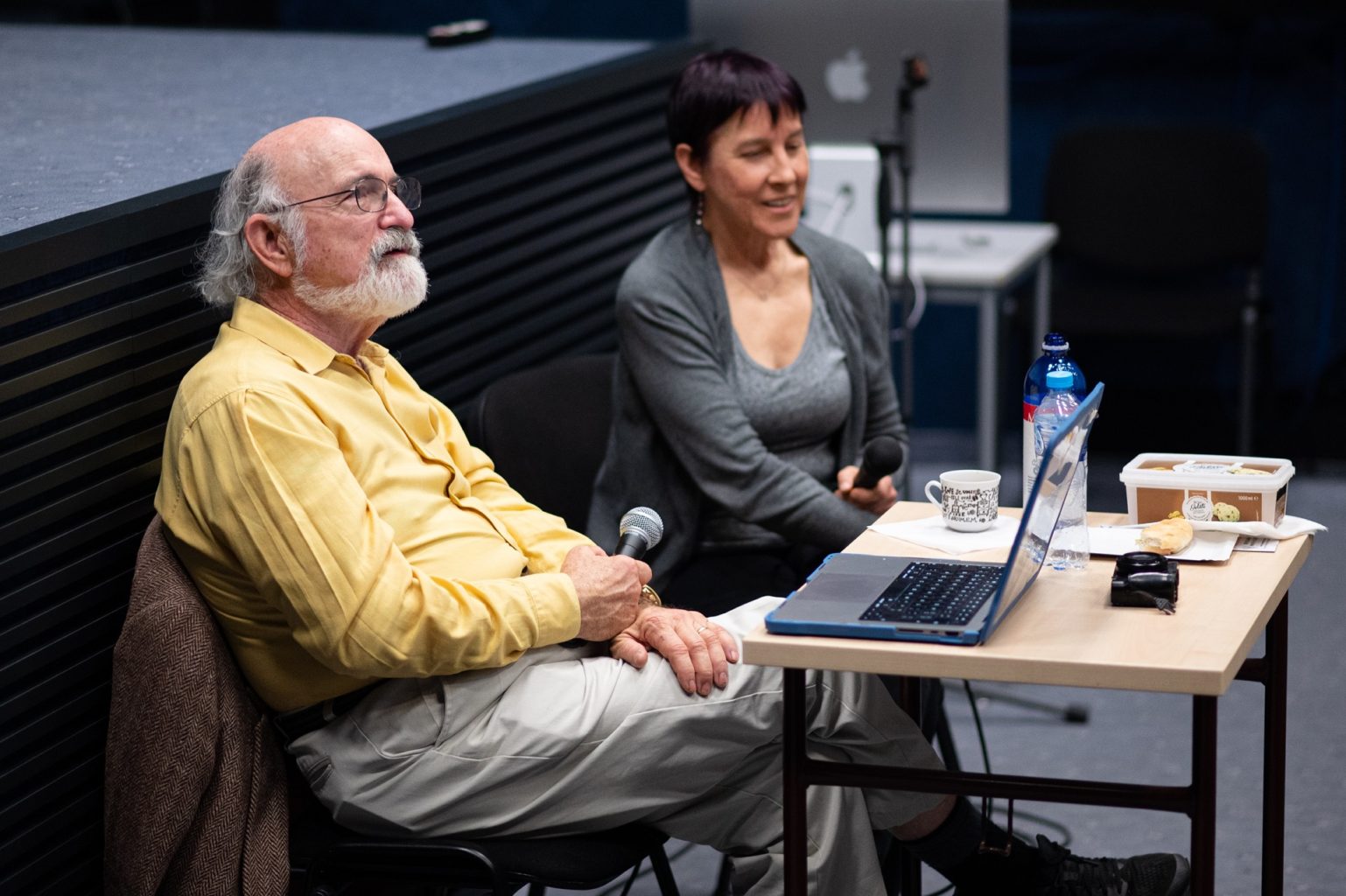Marku Ulano and Patrushkha Mierzwa are professionals in the field of film sound production. You could hear the result of their work in world-famous films such as Titanic, Django Unchained or the sci-fi drama Ad Astra.
They have been working together for 47 years and have also been part of Tarantino’s film crew for many years. Mark Ulano has one Oscar and several other nominations. Today, they both travel around the world to teach emerging filmmakers the art of sound and dispel the common misconception that sound is just a technical aspect of film. Mark and Patrushkha were also guests at the 10th Visegrad Film Forum, which took place on March 15-18, 2023 at the Film and Television Faculty of Academy of Performing Arts in Bratislava. Students and VFF visitors had a lecture lasting several hours.
In an exclusive interview for Moja kultúra SK, Mark and Patrushkha talk about the miraculous transition from silent to sound film, whether film sound can be considered good, what is unique about working with Quentin Tarantino, what his „last“ film will be about and what it sometimes looks like on the sets of Hollywood blockbusters.

You just saw the masterclass of the Iranian director Sepideh Farsi at the VFF, did you like it?
Patrushkha – Yes, it was interesting to see how studios from several countries collaborated on her film at the same time. It was also beneficial for me as a sound artist.
What is your masterclass about?
Mark – Our primary intention is to tell the story of sound as one of the important tools of film. To talk about sound as a creative component that has a wide range of possibilities to bring the film’s character and environment directly to the audience, in an immediate but subliminal way. Sound is a component that is rarely understood and recognized for how significant it’s role is in telling the story, but it brings a very strong emotional connection to the audience. What we do is difficult to describe not only for ordinary people, but also for other professional filmmakers. It’s not easy to name it, nor does our work process reveal anything obvious. People on the film set only see how we stand or sit surrounded by devices, but in reality they do not know what is happening there at that moment. Everything takes place in our ears and minds. Therefore, through these international workshops and lectures, we try to bring more understanding of our work.
We also try to explain that production sound is not something secondary, something that is added to the film later, but is achieved when the film is shot. It is an integral component that influences all others, and is also influenced by other components of the film. It’s a process that begins even before filming begins and continues throughout production until the end. We’re here to show emerging directors and producers that from the very beginning in pre-production, that sound is an essential part of the story telling creative pallette rather than some lesser technical requirement or damage control. The idea is how to use sound in a creative way during the entire process of making a film.
Patrushkha – I tell the audience about the work of a sound artist. Since technology is advancing by leaps and bounds and working with it is more complicated, there must be at least three people involved in production sound today, and utility sound technician is one of them. That’s actually my job. I wrote a book about the whole issue, which is quite popular and has become a standard teaching text in universties across the world. (smile), so I believe students want to know more about this position and how it all works on the big sets. My book uniquely brings into focus the full range of “soft skills“ needed to develop and survive a career in freelance filmmaking, beyond the world of Production Sound.
You say technology is changing rapidly, what does that mean for sound department? What are you able to do with sound technology today that you couldn’t do 30 years ago?
Mark – We can do more, but it’s not just about technology. In general, every filmmaking profession has its own technical basis. Compared to other professions, the work of a sound artist is paradoxically less technical. In my opinion, the most technical is the work of the actors. Imagine the first day of shooting, when the last scene of the film is shot, while the beginning of the story may not be realized until the end of the shoot. This is done due to location accessibility, actors‘ schedules, and other logistical considerations. The technical requirements for an actor need him to be able to adjust their performance to a given point in the script whenever necessary. And this is not only technique, but also an art. It’s the same with us as sound artists. We have our tools, our techniques, which serves us to find and capture the telling of the story. There is not only one version of good sound for film. Ask 10 different professionals or directors what they think good sound is and you’ll get 10 different answers.
So what is the true philosophy of film sound? When is it good?
Mark – You get the real answer when you answer the question: what makes the best sense for this movie? What will best support the idea we are working with? If we find what makes sense and meaning for a particular shot or scene, then we use all our techniques to achieve that. You have to ask what the real idea of the characters and the situation is, what they are about. Once you find it, you have to capture it. It’s the same for everyone who works on the set. They all work together to support the story. Sound is not an isolated part of the film. We work as a team and everyone contributes their part. As a utility sound technician, Patrushka and I spends 15 hours a day with actors like Leonardo DiCaprio, Brad Pitt, or Robert De Niro and helps them get that essence for the film along with the cameraman and others. Together we create something from nothing. It didn’t exist yesterday, and today we already have part of the story. Sure, there is an idea and there is a plan, but only filmmakers can make that idea a reality. That’s art and that’s important.
I will ask you. Are movies important to the world? I mean in the context of time and place. Now here in Slovakia, we are right next to Ukraine, where terrible things are happening and human drama is unfolding every minute. But I think art and movies have the power to move culture forward, to influence it. I wish it was even more effictive now. Movies influence culture, and culture influences behavior, laws, and society. Art has meaning.
I remember the statement of soccer player and coach Jorge Valdano, who said that soccer is the most important for him out of all the unimportant things in the world. Isn’t it the same with film? When people face a war or a global pandemic, movies are not important to them.
Mark – Maybe, but they will be important after the war.
Patrushkha – Also movies taught young people to experience feelings. It’s sad, but movies are one of the few things today that still evoke some emotion in people. Today, we all watch only flash news and music videos, we do not look up from our mobile phones. People do not experience emotions in ordinary life. Only movies will bring them waves of such experiences. The audience can relate to them emotionally.
Isn’t that a pity? It sounds like movies are partly contributing to this negative phenomenon.
Mark – Movies just continue the age-old human need to tell stories. We have been doing this for thousands of years. Through the stories told by the elders, young people learned to distinguish good from evil. Stories can help adolescents come into their adulthood. Stories are our humanity. Do movies always give such a message? Definitely not! But the possibility is always there. It may be true that now people in Ukraine probably do not need movies. But after the war, films will be important again to learn the lessons from this war. War becomes stories important to the future growth of the culture.
The movie Babylon was recently in cinemas, which discusses the advent of sound in film… (unfinished question).
Mark – Oh.
Did you not like the movie?
Mark – There are two things I could comment on this film. It is a very professionally made film. Many people worked on it, whom we know personally and have respect and appreciation for them and their work. On the other hand, I think it’s a very intellectually lazy and undignified portrayal of that era. From a historical point of view, it is one of the most important periods of cinema, not only for sound, but also for film in general. Babylon dishonors this period and denies respect to all the inventive pioneers who influenced it.
Patrushkha – What you see in the movie is not the historical truth.
Mark – Also, the portrayal of the film production sound in this movie supports all the stereotypes we know. I don’t mean only what concerns sound artists, but also all other professions – directors, actors, producers. The meaning of all these professions in Babylon is concentrated in one point for the one purpose of showing the untruth of the that time. If you want to see how sound has become a creative and key component of film? You won’t see it in Babylon. It’s distructive misrepresentation of the collaboration between the people on the set who worked to discover something great. It took almost 40 years for film to get to the 1920’s, the point in time when sound was attached to it. Of course, I see it personally, I’m not saying that you can’t like Babylon. From my point of view, it it negatively rewrites history and damages the reputation of important pioneering people.
Patrushka – In short, it is fiction. Babylon has great production value, but you cannot consider it historically relevant.
Rather, I was interested in the very presence of sound in film and the way it affected the art of cinema. But I’m glad we’re sticking with history for a while longer. Can you tell me how it really looked in practice?
Mark – The transition from silent to sound film (years 1928-1929, pos. ed.) took about eight months. Of course, no one knew how to do it. It was something completely new. Therefore, all the studios joined together and through the Academy of Motion Picture Arts and Sciences, created a school for the entire industry. Almost a thousand people attended and would learn how to make sound. In 1928, 90% of films were silent, a year later 90% of films had sound. An entire major industry has fundamentally changed in less than a year. It wasn’t just that microphones were added to the set. The film industry was one of the largest in America and in the world. The studios already had their established system. In those years, the distribution strategy, the technical equipment of cinemas and everything had to be fundamentally changed. It is a miracle that it was possible in such a short time.
If no one knew how to work with it, then who taught filmmakers how to make sound?
Mark – In the 1980s, I spoke with Edward Bernds, a sound mixer who worked with director Frank Capra for 18 years. He started with Capra and Columbia on the famous film It Happened One Night (1934). I asked Bernds how they actually figured out what to do. At that time, there were no books or manuals on how to work with sound. He replied that they were simply improvising/experimenting by trial-and-error. In the mentioned film, there is a scene in the rain. Bernds was explaining to me how he took a rubber inner tube from a car wheel and wrapped it around the 9 kilo brass microphone they were using back then so they could film the scene in the rain without the equipment shorting out. There are many such examples. You say it’s technical matters, I think it’s art through creative solutions to unexplored challenges. I don’t have a guide, but I have my own brain to use to support the film and the story.
Do you ever find yourself facing a problem you’ve never encountered before and need to find a new way to solve it?
Mark – Every day, every shot. Every shot is new and hand made!. You never do the same thing twice with a movie. It’s always a different situation, with different actors, different camera, in a different place, with a different setting. Of course, we have experience, we have a set of technical instruments for various purposes, we can estimate what we will need, but we always have to be creative. If I decide in advance how I’m going to record a scene and I’m not open to the circumstances that are happening right in front of me, I become limited in my options. I have to constantly ask myself what is important and how I can do it, how to bring it to the audience with the means at my disposal. I bring with me a lot of experience and technical facilities, but the most important thing is always recognizing the current challenge and the ideal solution.
Patrushkha – What we see during filming is a live theater. Our task is to react quickly and directly to what is happening in front of us. It can be said that we don’t know what we will actually do (smile).
Mark – It depends on who it is (smile).
Patrushkha – We know what the story is about, we have the script in our hands. But before filming, none of us saw exactly where it would be filmed, how the actors would move and what they would wear. We will learn all this on the spot and we must be able to react to it in a short time. You can’t fully prepare for it. We simply take all our things, equipment, pack up and go like a circus to the location. In case we know where it is. Today, it is a kind of trend among young directors not to tell us what and where we are going to do. Then at the last minute they show us where to put our things down and they want to shoot right away. They don’t even rehearse! In any other field, such an approach would be unacceptable. Moreover, it is extremely expensive. Sometimes these are unfortunate circumstances and the only thing we can work with at that moment is our ability to react to what is happening around us.
So this is what the directors of big Hollywood movies are like?
Mark – There are also traditionalist directors. Quentin Tarantino is one of them. He doesn’t use monitors to check the footage somewhere at a table, 30 meters from the stage. He sits next to the camera, right between the cast and crew. It represents the old era of directors like John Ford and others. He is both in front of and behind the camera when needed and focuses his energy directly on things that are important to him, such as performance. In addition, he has people around him who do not try to repeat what they have already done in the past and know that they could make their work easier by doing so, but they will not do it. The whole team is attuned to finding new solutions. Everyone wants to do things differently. Together we look for a solution that is best for the moment and try not to repeat it.
Patrushkha – He is a director who has done his homework and is fully prepared. Many others just come to the set, where everything is ready, the whole big and expensive crew is in place, and the director just sits down and says: let’s try and see what happens. Quentin explains to everyone in detail what the scene will be about, comes to the actors and tells them the whole history of their characters. He knows everything about them, where they come from, at what age they got married and when they got divorced. He tells each actor a special story and prepares them for what’s going to happen, and they rehearse everything together long before the day of filming and the money starts being spent. He also works with the rest of the crew. He takes us all to the location and shows us, where exactly the scene will take place and where we can set up our equipment.
Mark – Because he knows the camera won’t be looking that way and that’s why we can be there.
Patrushka – In the last 30 years of my experience, I met the only one director who could always tell me where I could put things, or which part of the location would not be in the picture, which helped me a lot with the organization of my things, and that was Quentin Tarantino. When shooting with other directors, we have to wait an endless amount of time for someone to make the final decision.
Mark – He also works with actors. He prepares them for roles weeks or even months before filming. So when the actors come to the set, they already developed their character’s identity and can immediately know what to do. It saves time and money. For such big movies, one minute of shooting time costs $3,000.
Patrushkha – Whether it is being filmed or not. This means that waiting 40 minutes for someone to decide where to put the camera is quite expensive.
Mark – It’s a „great“ opportunity to waste money.
Does this mean that an expensive film means only a poorly prepared film?
Patrushka – It can’t be generalized, but sometimes I have to ask the cameraman what kind of shot we’re shooting and he tells me that I should ask him again when he shoots it, because he has no idea either. Then how do I know where to place the microphone?
Tell me more about working with Tarantino. What is it like to be on set with him?
Mark – Quentin has a great feel for building a community of creators with a special connection. To explain it better, it’s like musicians in a band. The Beatles may not have been the best friends outside of work, but as a group they had an inimitable magic. As a director, Quentin encourages and builds this kind of atmosphere with every shoot. Robert Richardson has been his cameraman for 20 years. I met him back in 1995 while filming Desperado. These are long-term collaborations based on respect. If we know we have a tough day ahead and it will be a challenge, we are all automatically ready to do our best. We know everyone feels that way. Because the whole production is based on respect.
I will give an example. Cell phones are prohibited on Tarantino’s sets. Before you enter the filming location, you must turn in your phone to the phone warden. If you have it with you and he finds out, he will fire you and you are forbidden to appear on set again. I saw him fire the producer because of it (laughs). It’s not about ego, it’s about respect. It may be hard, but in time you will find that cooperation based on such measures is then on a completely different level. This is the only way that what we do can become a unique film.
Mark, you often compare film sound art to music. You are a musician yourself. Is it important for a sound artist to be a musician at the same time?
Mark –I don’t think it’s necessary but being a musician definitely helps. More important than being musicians is being filmmakers. So that they can understand connections beyond sound. But I’ll tell you something I’ve noticed over the years. There is a special connection between playing specific musical instruments and specific sound professions. Often sound artists have a background as a drummers, like me. The people who mix and edit the sound are usually guitarists, the re-recording masters are bass guitarists, and I could go on like this. I don’t know why it is like that and it is not a rule, but certain tendencies appear.
I would like to ask about the cooperation of the two of you. You’ve been on set together as a couple for 43 years. What do you admire most about each other’s work?
Mark – That’s a great question. I’ll start if you don’t mind.
Patrushkha – Go for it (laughs).
Mark – Patrushkha is an absolute professional and remains so even under extreme workload. In our work, we encounter a lot of pressure, which stresses anyone who is not used to it. She performs at her best under this pressure. Like me, she loves to prepare. She does her best to be prepared for all possible situations. Psychologically and practically, she expects the unexpected. Because unexpected things always happen, to which one needs to be able to react immediately.
She is also very diplomatic in the team. She often stands in the buffer zone between the sound mixer and the rest of the crew. She communicates our needs and requirements. I admire all these things about her, I love her as a person and as a professional (smile).
Patrushkha – Thank you.
Mark – I can go on if you want (laughs).
Patrushkha – Not necessary, but it’s good to listen to. I admire Mark’s sense of the right things and how calmly he can communicate with others on the set. Sometimes he even patiently uses an educational tone. Other sound mixers get stressed out easily. This is understandable, because sound mixers are often separated from the rest of the crew, which results in our presence being forgotten. We are a bit of a black sheep. Mark restores dignity to this position with his approach. It’s stressful and emotionally demanding work, but Mark is strangely very stable, observant and understanding. Sometimes it happens that I have to make certain decisions for him. As a sound mixer, he often sits with his equipment off the set and participates through me and the boom operators in the action on stage. It is then up to me to decide for him at certain moments as I think he would decide for himself. And he fully respects that. If you have a boss or a colleague who trusts your knowledge, then it is a joy to work.
Mark – It’s about trust. I don’t look at work hierarchically. I am not superior to anyone. I look at us as a jazz trio. Everyone is responsible for something and everyone’s work affects others. I depend on my team, as my team depends on me. Trust is the most powerful tool because you will never have enough time or money to just try things to see if they work or not.
Do you have your own working language? Where you don’t have to say a word and the other person knows what you need or want to say?
Patrushkha – Yes, precisely because we often work together, but I’m not physically in the same room together. Thanks to experience, we can already estimate what situations may arise and how to behave in them. If an actor moves away from the microphone, or the director decides to add another actor to the scene, one look from Mark is all I need to know what he wants me to do.
At the end, I will return to Tarantino once more. He recently announced that he is about to shoot his last film. Will you be working on it?
Patrushkha – Supposedly the last film (laughs). I would call it movie number ten.
Mark – I’m skeptical about whether this will be the last film, but we’ll see. Yes, we have already been contacted. They always call us 6-7 months before the shoot so we have enough time to prepare. Preparations are already underway and as far as I know, filming should start in October or November. If you had asked this a few weeks ago by them, I could not confirm anything yet. But, we definitely have accepted the invitation, we want to have the whole collection on the shelf (laughs).
Have you read the script yet?
Mark – Usually we get it really early, in preparation. We don’t have it yet this time, but I expect it to arrive in the next few weeks. Well, it is tentatively titled THE FILM CRITIC and possibly will be based on the film critic from the 70s, Pauline Kael. At one time, she was a prominent critic who also supported underappreciated films. She was able to look at films from a different perspective, and this perspective of hers was confirmed over time when the films she championed became cult classics. For example, Arthur Penn‘s movie, Bonnie and Clyde was panned by many of the other film critics at the time, in 1967 and today it is considered a classic. She knew it.
Patrushkha – And it will again be a film about the love of films. Like Once Upon a Time in Hollywood.
Mark – I really enjoy working on these films. His films always provide the best personal experience for professionals in this industry. He is one of the few directors who has absolute control over his project. Therefore, nothing prevents those projects from always being about the best ideas, best intentions and unique opportunities.
Matúš Trišč
Photo: Visegrad Film Forum









